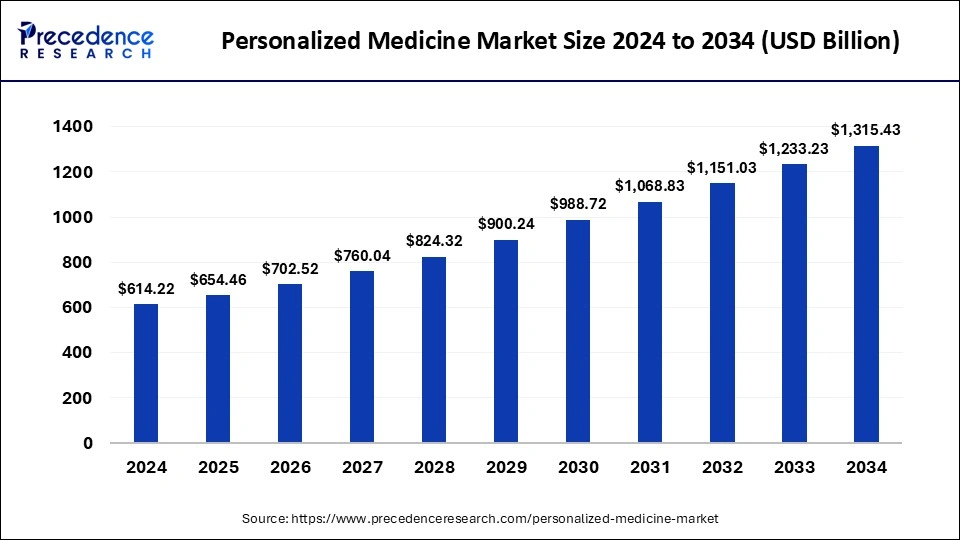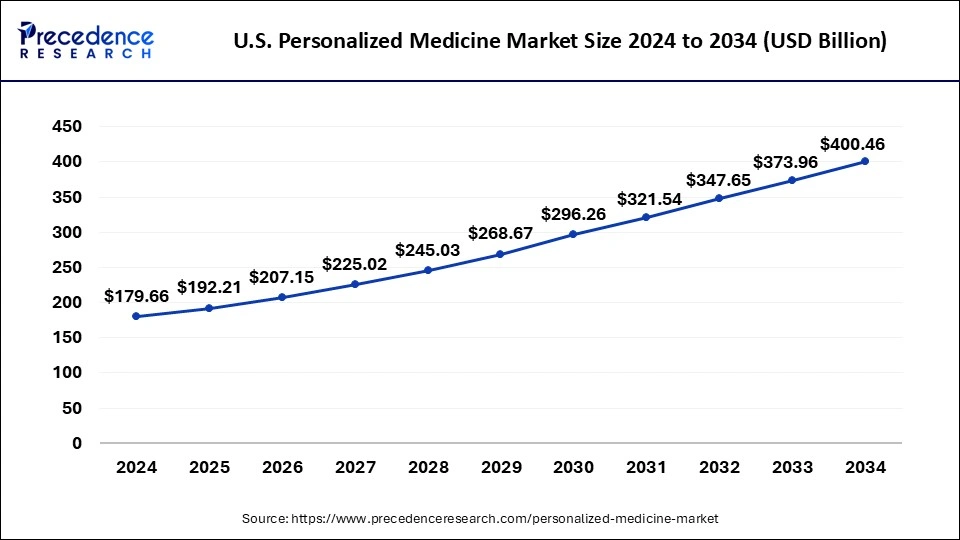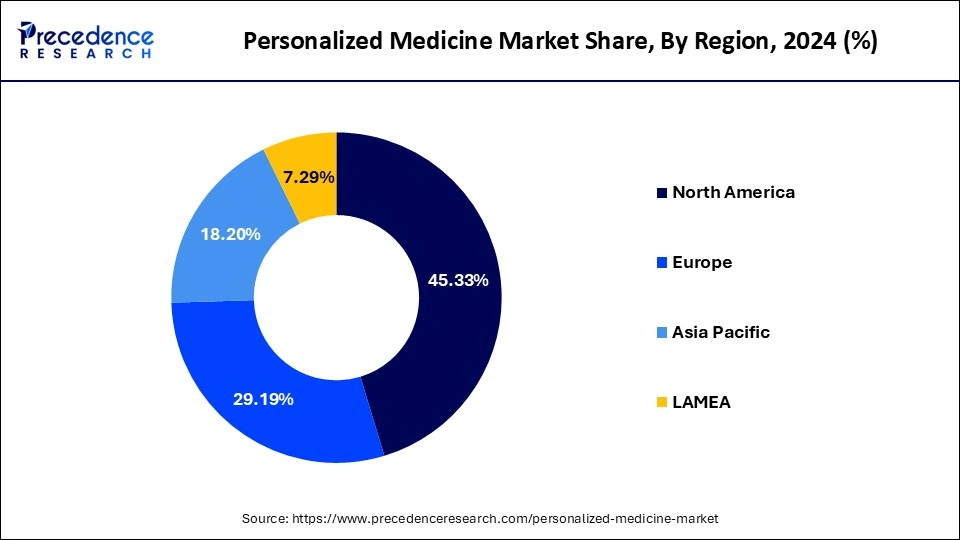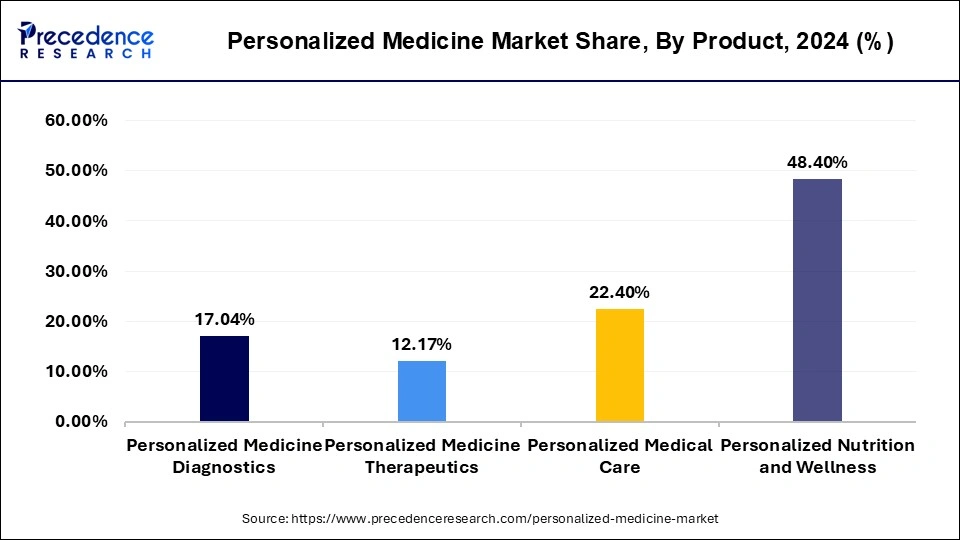February 2025
The global personalized medicine market size is accounted at USD 654.46 billion in 2025 and is forecasted to hit around USD 1,315.43 billion by 2034, representing a CAGR of 8.10% from 2025 to 2034. The North America market size was estimated at USD 278.40 billion in 2024 and is expanding at a CAGR of 8.20% during the forecast period. The market sizing and forecasts are revenue-based (USD Million/Billion), with 2024 as the base year.
The global personalized medicine market was calculated at USD 614.22 billion in 2024 and is predicted to increase from USD 654.46 billion in 2025 to approximately USD 1,315.43 billion by 2034, expanding at a CAGR of 8.10% from 2025 to 2034.

The U.S. personalized medicine market size was exhibited at USD 179.66 billion in 2024 and is projected to be worth around USD 400.46 billion by 2034, growing at a CAGR of 8.50% from 2025 to 2034.

North America dominated the personalized medicine market in 2024. The increased adoption rate of healthcare information technology systems in clinical workflows, as well as next generation sequencing technologies, which help generate tailored and pharmacogenomic data quickly and easily are contributing to the growth of the personalized medicine market in the North America region.
Asia-Pacific, on the other hand, is expected to develop at the fastest rate during the forecast period. This is due to the low cost of conducting clinical trials of newly created precision medicines and diagnostics in this region, which draws foreign investment in the Asia-Pacific.

Personalized medicine is a sort of treatment that focuses on each patient’s unique physiological characteristics. Personalized medicine offers a big potential in leading the healthcare business with significant changes and adaptations, which a focus an illness understanding and management using advanced analytics, customized medicines, patient data, and other options.
The primary growth drivers of the global personalized medicine market are the development of efficient and advanced technology, increased public awareness about personalized medicine, increasing government initiatives around the world, and the growing development of genetic databases. Furthermore, rising customized medicine usage in neurology, pulmonary, antiviral, and psychiatry, as well as emerging economies, would open up new potential for the global personalized medicine market. On the other hand, the global personalized medicine market is restrained by increased research and development costs and a higher risk of negative effects.
The rise in the number of patients suffering from chronic diseases such as diabetes and cancer, as well as the demand for rapid onset action treatment procedures, the rise in the use of combined drug therapies, the global ageing population, and the increase in clinical trials for personalized medicine in neurology departments, are all driving the growth of the personalized medicine market during the forecast period.
Moreover, the personalized medicine market is expected to grow due to an increase in the adoption of advanced healthcare facilities, an increase in the costs of developing advanced infrastructures, the benefits and effectiveness associated with the use of personalized medicines, research institutes’ development of efficacy and quality of personalized drugs, and recent advances in pharmacogenomics.
The personalized medicine market’s expansion is hampered by the high cost of customized pharmaceuticals. On the other hand, favorable government reimbursement rules and a minimal chance of medical defects and side effects are likely to provide profitable market expansion potential.
The global market for personalized medicine is predicted to be fueled by the growing domination of various types of cancer, the affordability of personalized medicine therapy in cancer medications, and several other illness indications. Cancer is the biggest cause of mortality worldwide, according to the World Health Organization (WHO), with an estimated 9.6 million deaths in 2018. This means that cancer is responsible for around 1 in every 6 deaths worldwide.
The scope of personalized medicine is likely to rise enormously over the projection period, as it has helped target malignant tissues. Aside from that, fewer side effects and a high acceptance rate in developed markets will improved the global market for personalized medicine. The use of customized medicine opens up the possibility of designing specific therapeutic solutions for various patients based on their immunophenotype.
However, each treatment has its own set of benefits and drawbacks. Personalized medicine market faces number of problems such as limited number of marketing strategies, lack of consumer awareness, stringent government regulatory framework, and limited ability to integrate data sources.
In Asia-Pacific and Latin America, the personalized medicine market is growing. During the forecast period, this tendency is expected to continue. The presence of big patient pool, the expansion of the healthcare industry, and increased government investments in healthcare enhancement are expected to boost the personalized medicine market in these regions.
Due to increased public awareness about the use of personalized medicine therapy to treat various types of cancer and rapid innovations in personalized medicine for various other disorders, the personalized medicine market in emerging nations is expected to grow at a significant rate during the forecast period.
| Report Coverage | Details |
| Market Size in 2025 | USD 654.46 Billion |
| Market Size by 2034 | USD 1,315.43 Billion |
| Growth Rate from 2025 to 2034 | CAGR of 8.10% |
| Largest Market | North America |
| Fastest Growing Market | Asia Pacific |
| Base Year | 2024 |
| Forecast Period | 2025 to 2034 |
| Segments Covered | Product, Application, End Use, Technology, Region |
| Regions Covered | North America, Europe, Asia-Pacific, Latin America and Middle East & Africa |
Based on the product, the personalized nutrition and wellness segment dominated the personalized medicine market in 2024. Consumers are becoming aware of dietary recommendations based on individual genetic profiles, driving a shift toward adopting personalized nutrition and wellness. Technological advancements such as next-generation sequencing and genomic technologies are advancing genetic testing to improve efficiency and cost-effectiveness, significantly impacting personalized nutrition and wellness services. The increased availability and accessibility of personalized nutrition and wellness are playing a crucial role in segment growth. Additionally, the over-the-counter purchase of segment is contributing the highest share in the market.

Personalized medicine therapeutics is observed to be the fastest growing segment in the market due to several factors including increased adoption of targeted therapies, demand for precision medicines, and advancement in genomic technologies such as next-generation sequencing. The advanced next-generation sequencing technologies are shipping personalized medicine therapeutics area by providing high-quality rapid cleansing with a cost-effective nature, making it more accessible and affordable for patients. Growing pharmaceutical and biopharmaceutical companies’ investments in research and development institutes for the development of novel targeted therapies and precision medicines are further leveraging the segment growth.
| Product | 2022 | 2023 | 2024 |
| Personalized Medicine Diagnostics | 94.93 | 99.28 | 104.66 |
| Personalized Medicine Therapeutics | 66.18 | 70.04 | 74.72 |
| Personalized Medical Care | 123.35 | 129.74 | 137.55 |
| Personalized Nutrition and Wellness | 264.26 | 279.16 | 297.28 |
The oncology segment accounted for the largest market share with increased adoption of personalized medicines based on individual genetic profiles to treat cancer. Increased cancer prevalence has driven a large shift of researchers and healthcare providers toward the development and adoption of personalized medicines. Target treatments help to identify specific mutations within a patient's tumor, to allow tailored therapies with enhanced efficacy and reduced side effects compared to conventional treatment solutions. Advanced genomic technologies such as next-generation sequencing play a vital role in improving the accessibility and affordability of personalized medicines in oncology. The segment is further emerging growth due to ongoing innovation and developments of cancer biomarkers, and advancement in monoclonal antibodies and immunotherapies.
On the other hand, the CNS (central nervous system) segment is projected to witness significant growth in the forecast period. The segment growth is attributed to increased adoption of target therapies based on individual genetic profiles for neurological disorders such as Parkinson’s disease, Alzheimer’s disease, depression, and certain types of cancers affecting the CNS. Rising awareness of genetic profile relation with neurological disorders enables researchers to innovate genetic mutations for tailored treatment options. Additionally, the identification of specific biomarkers for CNS diseases is projecting further segment expansion in the upcoming period.
The hospitals segment dominated the market in 2024. The segment growth is attributed to the increased adoption of genomic technologies and targeted therapies in hospital settings. Hospitals are dedicated to several research & development institutes for the development of new personalized medicines, driving significant impact on segment growth. These collaborative approaches are advancing the field. Hospitals are prior providers of advanced diagnostics technologies. Additionally, the availability of skilled medical staff access to genetic data interpretation, and leveraging personalized treatment plans, play pivotal roles in the hospital segment.
However, the research & academic institutes segment is seen to witness the fastest rate of growth during the predicted timeframe. Research and academic institutes are the pioneers of innovation and the development of genomic technologies to advance personalized medicines. These institutes determined the development of novel technologies and treatment solutions, such as gene therapy & gene editing to transform personalized medicine settings. The major factor driving segment expansion is government investment and funding for research & academic institutes. Furthermore, several pharmaceutical & biopharmaceutical companies are collaborating with research & academic centers to contribute to advancing personalized medicine areas shaping the segment to grow further.
By Product
By Application
By End-use
By Technology
By Geography
For inquiries regarding discounts, bulk purchases, or customization requests, please contact us at sales@precedenceresearch.com
No cookie-cutter, only authentic analysis – take the 1st step to become a Precedence Research client
February 2025
November 2024
October 2024
February 2025